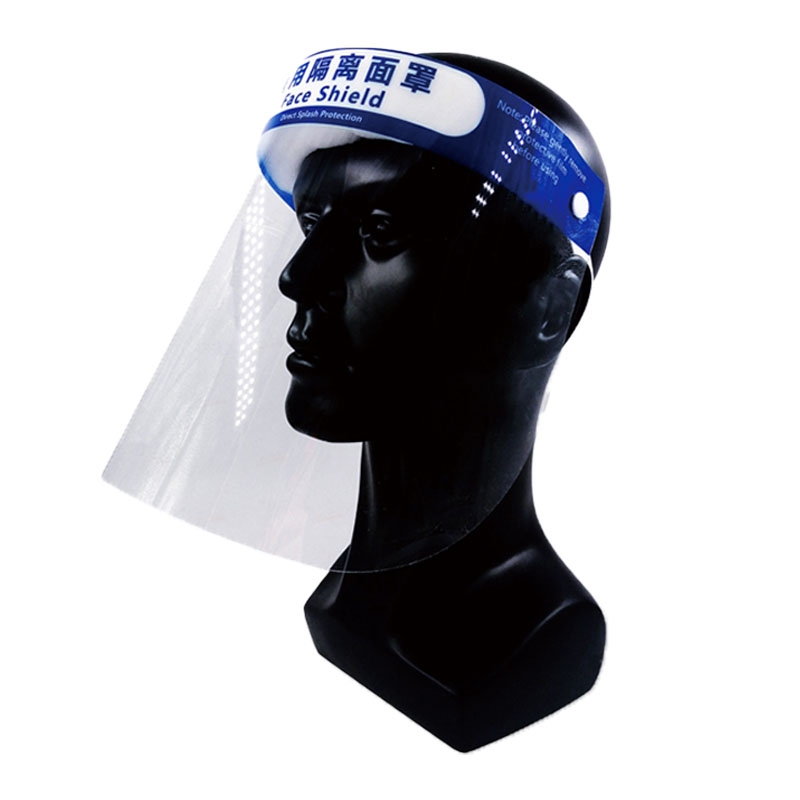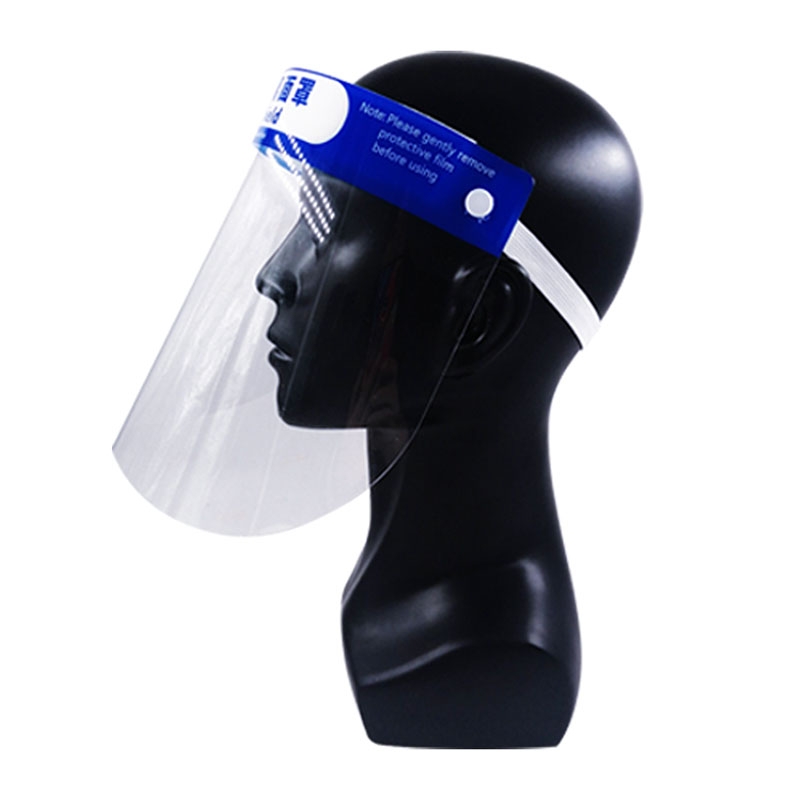Enhance Safety with Clear Polycarbonate Faceshields
Personal protective equipment (PPE) is crucial in workplaces to protect employees from potential hazards. According to the Occupational Safety and Health Administration (OSHA), proper PPE usage significantly reduces injury rates, with some sectors experiencing up to a 50% drop in workplace injuries. Faceshields are particularly vital among PPE, offering critical defense against hazards like chemical splashes, flying debris, and infectious agents. They provide comprehensive facial protection, ensuring the safety of workers across diverse industries such as manufacturing, healthcare, and construction. Incorporating faceshields effectively mitigates facial injury risks and improves overall workplace safety standards.

Understanding Polycarbonate Faceshields
Definition and Characteristics of Polycarbonate Material
Polycarbonate is a high-performance plastic known for its exceptional strength, durability, and optical clarity. This thermoplastic material is produced through a polymerization process, resulting in a substance that is lightweight yet incredibly resilient. Widely utilized in safety applications, polycarbonate stands out for its ability to withstand significant impacts without shattering, making it ideal for faceshields and other protective equipment.
Advantages Over Other Materials Like Acrylic or Glass
Polycarbonate faceshields offer distinct advantages over those made from materials such as acrylic or glass. Unlike acrylic, which is prone to cracking under stress, polycarbonate is virtually unbreakable, providing superior protection against impacts. Additionally, polycarbonate is lighter than glass, reducing wearer fatigue and enhancing comfort during prolonged use. Its high resistance to heat and chemicals ensures effectiveness in diverse hazardous environments where other materials may falter.
Types of Faceshields and Their Applications
Polycarbonate faceshields are available in various types to meet specific protection needs. Full-face shields provide comprehensive coverage, protecting against splashes, debris, and infectious agents. These are commonly used in healthcare settings, laboratories, and industrial environments requiring maximum facial protection. Half-face shields cover the lower face, offering flexibility and lighter weight suitable for tasks involving lower face impacts or splashes.
Benefits of Clear Polycarbonate Faceshields
High Impact Resistance and Durability
Clear polycarbonate faceshields are prized for their remarkable impact resistance. Capable of absorbing substantial force without breaking, polycarbonate effectively shields the face from flying debris, projectiles, and other potential hazards. This durability ensures long-lasting protection, even in demanding environments where impacts are frequent.
Optical Clarity for Better Visibility
Clear polycarbonate faceshields provide excellent optical clarity essential for maintaining visibility while worn. This clarity allows workers to perform tasks without visual impairment, reducing the risk of accidents caused by poor visibility. The high transparency of polycarbonate also facilitates clear communication and enhances interaction in environments where facial expressions and visual cues are crucial.
Lightweight and Comfortable for Extended Wear
Polycarbonate faceshields are lightweight, enhancing comfort during prolonged use. This feature is particularly beneficial in industries where workers must wear protective gear for extended periods. Reduced weight minimizes neck and head strain, enabling workers to remain productive and focused without the discomfort associated with heavier equipment.
Applications and Industries Using Polycarbonate Faceshields
Healthcare Settings
In healthcare settings such as hospitals and clinics, polycarbonate faceshields are indispensable for protecting medical staff from infectious agents and bodily fluids. These shields create a barrier that prevents contamination and reduces the risk of disease transmission. Their durability and optical clarity make them ideal for environments where hygiene and visibility are paramount concerns.

Industrial Workplaces
Polycarbonate faceshields find extensive use in industrial workplaces, including manufacturing and construction sites. These environments expose workers to hazards such as flying debris and chemical splashes that can cause serious facial injuries. Full-face polycarbonate shields provide comprehensive protection, ensuring worker safety while allowing them to perform tasks effectively and securely.
Laboratory Environments
Laboratories handle hazardous chemicals and materials, posing significant risks to personnel. Polycarbonate faceshields offer essential protection against splashes, spills, and impacts in these settings. Their resistance to chemical exposure and high durability make them a reliable choice for laboratory personnel needing robust safety measures while handling dangerous substances.
Andanda’s Clear Polycarbonate Faceshield
Soft and Comfortable Thickened Sponge
Andanda’s clear polycarbonate faceshield features a soft and thickened sponge, providing exceptional comfort during extended wear. This sponge ensures a secure and comfortable fit against the forehead, minimizing pressure and discomfort for the wearer. Additionally, it absorbs sweat effectively, enhancing overall comfort and allowing users to remain focused on their tasks without distraction.
High-Performance Antifogging Coating
Equipped with a high-performance antifogging coating, Andanda’s faceshield effectively prevents fog buildup even in humid or high-temperature conditions. This coating maintains clear visibility throughout use, ensuring that users can work efficiently and safely without the need to frequently wipe the shield. It enhances workplace safety by providing continuous clear vision, crucial for tasks requiring precision and attention to detail.
Full Transparent Open Vision
Andanda’s faceshield is designed with full transparency, offering users an unobstructed view of their surroundings. This feature enhances situational awareness and safety, allowing wearers to see clearly without any visual hindrance. The clear polycarbonate material provides excellent optical clarity, ensuring that users can perform their tasks with precision and confidence.
Standard GB 14866-2006
Meeting the stringent requirements of the GB 14866-2006 standard, Andanda’s clear polycarbonate faceshield guarantees superior safety and quality. This certification confirms that the faceshield has undergone rigorous testing and complies with established standards for protective equipment. Users can rely on its durability and performance in various hazardous environments, knowing it meets the highest safety benchmarks.
Maintenance and Care Tips
Cleaning Procedures to Maintain Clarity
To preserve clarity, regularly clean the faceshield with mild soap and water. Avoid abrasive cleaners or solvents that could damage the polycarbonate or its antifogging coating. Use a soft, lint-free cloth to gently wipe the surface, preventing scratches and maintaining optical clarity for optimal visibility.
Storage Practices to Prolong Faceshield Lifespan
Proper storage is essential for extending the faceshield’s lifespan. Store it in a clean, dry place away from direct sunlight and extreme temperatures. Utilize a protective case or cover to shield it from dust and debris, which can scratch the surface and diminish clarity over time.
Inspection Guidelines for Signs of Wear or Damage
Regularly inspect the faceshield for any signs of wear, damage, or deterioration. Check for scratches, cracks, or fogging that could impair visibility and compromise protection. Ensure the sponge padding remains intact and comfortable against the forehead. Replace the faceshield promptly if significant wear or damage is detected to maintain optimal safety and performance in hazardous environments.
Final Thoughts
Clear polycarbonate faceshields are essential for ensuring safety and comfort across diverse professional settings. Their exceptional impact resistance, optical clarity, and lightweight construction surpass alternatives like acrylic or glass. Equipped with features such as a comfortable thickened sponge, effective antifogging coating, and compliance with the GB 14866-2006 standard, these faceshields deliver dependable protection and durability. By prioritizing regular maintenance, proper storage, and thorough inspections, users can prolong the lifespan of faceshields, ensuring sustained safety from potential workplace hazards. Choosing clear polycarbonate faceshields represents a proactive commitment to bolstering workplace safety standards and enhancing overall productivity.

